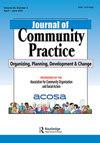戴恩县黑人社区的第三空间和阿片类药物使用:定性二级数据分析
IF 1.2
Q2 SOCIAL WORK
引用次数: 1
摘要
摘要本研究利用威斯康星州卫生服务部评估人员最初收集的数据,创建了二次数据分析,以调查丹县黑人居民中阿片类药物的使用和滥用情况。社会学家埃里克·克林伯格将社会基础设施一词定义为塑造人们互动方式的物理场所和组织。这项研究分析了达内县黑人女性、男性和青年的对话,他们讨论了社会基础设施,特别是第三空间,作为药物滥用的一个促成因素的作用。本研究采用现象学设计分析了11个焦点小组和访谈记录,有助于填补学术文献中对受阿片类药物危机影响的黑人居民的第一手描述的空白。受访者透露,达内县黑人社区的阿片类药物使用异常复杂,涉及多个系统和结构,远远超出了个人的选择和行为,而这往往被认为是药物滥用的根源。第一手资料描述了被拒绝进入空间的影响,以及缺乏社会基础设施对他们生活的影响。这项研究的结果有助于支持黑人社区易于获得的社会、经济和政治资源,以减少阿片类药物滥用的论点。本文章由计算机程序翻译,如有差异,请以英文原文为准。
Third spaces and opioid use within Black communities of Dane County: a qualitative secondary data analysis
ABSTRACT This study utilizes data initially collected by evaluators at Wisconsin’s Department of Health Services to create a secondary data analysis to investigate the opioid use and misuse among Black residents of Dane County. Sociologist Eric Klinenberg defines the term social infrastructure as the physical places and organizations that shape the way people interact. This study analyzes conversations of Black women, men, and youth throughout Dane County as they discuss the role of social infrastructure, specifically Third Spaces, as a contributing factor to drug abuse. Using a phenomenological design to analyze eleven focus groups and interview transcripts, this study helps fill the gap in scholarly literature of first-hand accounts from Black residents who have been impacted by the opioid crisis. Interviewees reveal that opioid use in Black communities throughout Dane County is exceptionally complex and involves multiple systems and structures that reach far beyond individuals’ choices and behaviors, which are often alluded to as the root of drug abuse. The first-hand accounts depict the impact of being denied access to spaces and how the absence of social infrastructure has impacted their lives. The results of this study help support arguments for easily accessible social, economic, and political resources in Black communities to reduce opioid abuse.
求助全文
通过发布文献求助,成功后即可免费获取论文全文。
去求助
来源期刊

Journal of Community Practice
SOCIAL WORK-
CiteScore
2.40
自引率
18.20%
发文量
27
期刊介绍:
The Journal of Community Practice is an interdisciplinary journal grounded in social work. It is designed to provide a forum for community practice, including community organizing, planning, social administration, organizational development, community development, and social change. The journal contributes to the advancement of knowledge related to numerous disciplines, including social work and the social sciences, urban planning, social and economic development, community organizing, policy analysis, urban and rural sociology, community health, public administration, and nonprofit management. As a forum for authors and a resource for readers, this journal makes an invaluable contribution to the community"s conceptualization, applications, and practice.
 求助内容:
求助内容: 应助结果提醒方式:
应助结果提醒方式:


